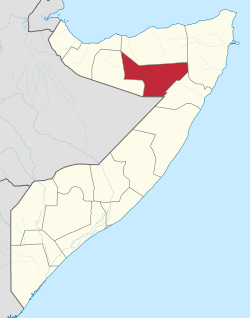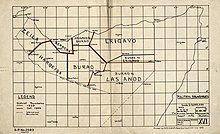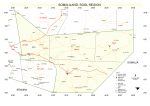Sool
Sool
| |
|---|---|
Region | |
 | |
 Location in Somalia | |
 Location in Somaliland | |
| Country | |
| Administrative centre | Las Anod |
| Government | |
| • Governor (disputed since January 2023) | Abdikarim Adan Haji Diriye[2][3] |
| Area | |
• Total | 39,240 km2 (15,150 sq mi) |
| Population (2019[4]) | |
• Total | 618,600 |
| • Density | 16/km2 (41/sq mi) |
| Time zone | UTC+3 (EAT) |
| HDI (2021) | 0.338[5] low · 8th of 18 |
Sool (Somali: Sool, Arabic: صول) is a disputed administrative region (gobol).[6][7][8] It borders Togdheer to the west, Sanaag to the north, Ethiopia to the south and Nugal, Bari to the east. Its capital city is Las Anod. The region is disputed by the self-declared Republic of Somaliland and SSC-Khatumo. The region is partially controlled by both polities.[1]
History

From 1944 to 1974, the Sool region was formerly Las Anod district. It was one of three districts under British protection. The other two districts were the Burao and hargeysa districts.[10]
In 1974 most Sool was part of the larger Nugaal region, with its capital at Garowe. It was established as a separate region in 1984 with its capital at Las Anod.[11]
Las Anod conflict
Due to the prolonged conflict between Somaliland and Puntland, many Dhulbahante and Warsangeli living in the region did not recognize the Sool region and eastern Sanaag, as either Somaliland or Puntland.[12] On 5 January 2023, Somaliland forces withdrew from Las Anod after mass civil unrest in the city.[13] On October 19, the government of Somalia recognized the state of SSC-Khaatumo as a federal member.[14] Since the defeat of Somaliland troops in the base in Goojacde, much of Sool has been under the control of SSC-Khatumo.[1][15]
Demographics
The Eastern part of the Sool region is almost exclusively inhabited by Dhulbahante.[16][17][18][19] Michael Walls reports:
"The residents of Sool overwhelmingly hail from a single clan grouping in the form of the Dhulbahante [...]. Sool boasts a degree of kinship homogeneity that is rare even in the Somali Horn".[20]
The Habr Je'lo clan of the Isaaq clan-family make up the vast majority of the population in western Sool, including the region's second largest town Aynaba,[21] as well as the wider Aynaba District.[22]
The Habr Yunis sub-division of the Garhajis Isaaq also inhabit the western parts of Hudun and Las Anod districts in northern Sool.[23]
The Dhulbahante sub-division of the Harti Darod clan primarily inhabits the Taleh, eastern Hudun and Las Anod districts in eastern Sool.[24][25][26] The Fiqishini sub-clan of the Habar Gidir Hawiye[27] integrated into Baho Nugaaled Dhulbahante,[28] inhabit the area around Adhi'adeye.[29][30]
Districts
The Sool region consists of 4 districts: Caynabo, Xudun, Taleex and Laas Canood.[31]
Villages
Maps
-
Detailed map
-
Military situation in Somalia and Somaliland as of December 2024
See also
- Administrative divisions of Somaliland
- Regions of Somaliland
- Districts of Somaliland
- Somalia–Somaliland border
References
- ^ a b c d "On the Horizon: October 2023-March 2024 Crisis Group". www.crisisgroup.org. 18 October 2023. Archived from the original on 19 January 2024. Retrieved 27 January 2024.
- ^ "Sool Governor Abdikarim Adan Haji Diriye in yagoori conference". 28 January 2022. Archived from the original on 12 October 2023. Retrieved 21 October 2022.
- ^ "Gudomiyaha Gobalka sool Abdikarin Haji Diiriye koormeray taliska sool". 24 February 2022. Archived from the original on 12 October 2023. Retrieved 21 October 2022.
- ^ "Somalia: Subdivision and cities". www.citypopulation.de. Archived from the original on 25 April 2024. Retrieved 14 February 2024.
- ^ "Sub-national HDI - Area Database - Global Data Lab". hdi.globaldatalab.org. Archived from the original on 23 September 2018. Retrieved 13 September 2018.
- ^ "Catching up on human rights needs in Sool and Sanaag after four years". 22 June 2022. Archived from the original on 30 June 2022. Retrieved 9 January 2023.
- ^ "Detailed Site Assessment (DSA): Sool region, Somaliland (March 2022)". reliefweb.int. 20 April 2022. Retrieved 7 December 2022.
- ^ "European Union Agency for Asylum (EUAA) Sool". Archived from the original on 25 December 2023. Retrieved 25 December 2023.
- ^ "Development map, roads, 1944". Library of Congress. Archived from the original on 12 October 2023. Retrieved 17 March 2022.
- ^ "Development map, roads, 1944". Library of Congress. Archived from the original on 12 October 2023. Retrieved 17 March 2022.
- ^ "Somalia (1988)". CIA. December 1988. Archived from the original on 1 April 2016. Retrieved 21 February 2007.
- ^ Ahmed M. Musa (2021). "Lasanod: City at the margins" (PDF). p. 14. Archived from the original (PDF) on 8 February 2023. Retrieved 28 November 2021.
- ^ "February Alerts and January Trends 2023". www.crisisgroup.org. 31 January 2023. Archived from the original on 19 January 2024. Retrieved 27 January 2024.
- ^ "Somali Federal Government Recognizes New SSC-Khatumo Administration". 19 October 2023. Archived from the original on 29 October 2023. Retrieved 8 December 2023.
- ^ "Somalia: SSC Forces Capture Somaliland's Goojacade military Base". 25 August 2023. Archived from the original on 26 August 2023. Retrieved 8 December 2023.
- ^ "The political development of Somaliland and its conflict with Puntland" (PDF). Institute for Security Studies: 10. Archived (PDF) from the original on 20 April 2023. Retrieved 15 June 2021.
- ^ Hohne, Markus V. (2006). "Political identity, emerging state structures and conflict in northern Somalia". Journal of Modern African Studies. 44 (3): 405. doi:10.1017/S0022278X06001820. S2CID 54173895.
- ^ "Somaliland vs. Puntland over the future of Somalia" (PDF). Horn of Africa Bulletin. Archived from the original (PDF) on 20 September 2019. Retrieved 20 September 2019.
- ^ International Crisis Group. "Somaliland: The Strains of Success" (PDF): 4. Archived (PDF) from the original on 12 October 2023. Retrieved 20 September 2019.
{{cite journal}}: Cite journal requires|journal=(help) - ^ Walls, Michael. "Sool Region: sovereign ambiguity vs a geopolitical system of nation-states?". Africa Research Institute. Archived from the original on 12 October 2023. Retrieved 20 September 2019.
- ^ Renders, Marleen (2012). Consider Somaliland : state-building with traditional leaders and institutions. Leiden: BRILL. ISBN 978-90-04-22254-0. OCLC 775301944. Archived from the original on 10 July 2020. Retrieved 15 August 2021.
Eastern Sanaag and Sool had not been Egal's priority. The president did not strictly need these regions to be under his military control in order to preserve and consolidate his position politically or in terms of resources.
- ^ "EASO Country of Origin Information Report - Somalia Security Situation" (PDF). February 2016. Archived (PDF) from the original on 11 July 2023. Retrieved 15 August 2021.
- ^ "EASO Country of Origin Information: Report Somalia Security Situation" (PDF). European Asylum Support Office: 74. February 2016. Archived (PDF) from the original on 9 March 2023. Retrieved 15 June 2021.
- ^ Walls, Michael. "Sool Region: sovereign ambiguity vs a geopolitical system of nation-states?". Africa Research Institute. Archived from the original on 12 October 2023. Retrieved 20 September 2019.
- ^ "Somaliland vs. Puntland over the future of Somalia" (PDF). Horn of Africa Bulletin. Archived from the original (PDF) on 20 September 2019. Retrieved 20 September 2019.
- ^ "The political development of Somaliland and its conflict with Puntland" (PDF). Institute for Security Studies: 10. Archived (PDF) from the original on 20 April 2023. Retrieved 15 June 2021.
- ^ Höhne, Markus Virgil (2015). Between Somaliland and Puntland : marginalization, militarization and conflicting political vision. London. p. 99. ISBN 978-1-907431-13-5. OCLC 976483444.
{{cite book}}: CS1 maint: location missing publisher (link) - ^ Political Orientations and Repertoires of Identification: State and Identity Formation in Northern Somalia, 2011, Markus Hoehne, p. 285, "Schlee (1994 [1989]: 223) confirmed that... Fiqishiini ’."
- ^ "Waqtiga Celeema saarka Sultaanka Beesha FIQISHINI oo la shaaciyey". halgan.net. 11 May 2016. Archived from the original on 12 October 2023. Retrieved 25 July 2021.
- ^ "Qaban-Qaabada Suldaanka Beesha Fiqishini Oo Laga Dareemayo Degmada Laascaanood Iyo Wufuud Kusii Qulqulaysa Adhicadeeye". laascaanood.com. 17 May 2016. Archived from the original on 26 January 2023. Retrieved 25 July 2021.
- ^ "Sool Region" (PDF). Archived (PDF) from the original on 4 March 2016. Retrieved 30 December 2013.




